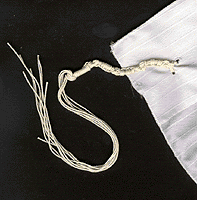“Rabbi Levi Yitzchak of Berditchev is reputed to have said that one strand of tzitzit (fringe) on a prayer shawl in paradise would cause it to go up in flames.
Although the divine light is revealed in paradise, the incomparably greater revelation of divinity within that tzitzit would utterly consume it.
That being the case, why is it that a person can put on tzitzit and not be charred into ash?
The answer is that he is not in paradise but rather in a framework that conceals God’s grace—a framework of body and soul.
That combination makes it possible for him to achieve things that the pure soul alone could not do—for, were the soul to touch upon them, it would cease to exist.
However, this combination of body and soul must be kept in balance.
To sustain his connection with the divine, a person must have some degree of imperviousness and denseness.
On the other hand, he must stay sufficiently mindful to avoid becoming overly dense.
Rabbi Yitzchak Meir Alter of Gur (founder of Gur Hasidism and author of Chiddushei Harim) comments on the verse ‘You ignored the Rock Who bore you, and you forgot God Who formed you’ (Deuteronomy 32:18) that God created man with the power to ignore the sufferings and desires of this world and turn his mind to serving God.
But instead man uses that ability to forget ‘God Who formed you.’
The ability to engage in holy endeavors— Torah and mitzvot—is itself the ability to be completely opaque to any holiness.
An angel sees God but cannot perform the slightest mitzvah; man, who cannot see God, is capable of performing the mitzvot.
This is the essence of a human being.
His power to choose—his ability either to cleave to God or to deny His existence—creates the human psyche.”
–Rabbi Adin Steinsaltz
From Understanding the Tanya by Rabbi Adin Steinsaltz

